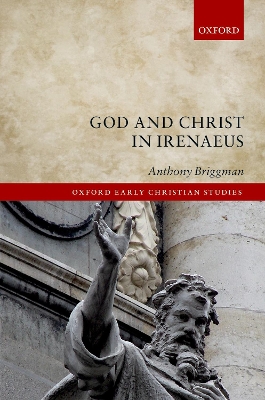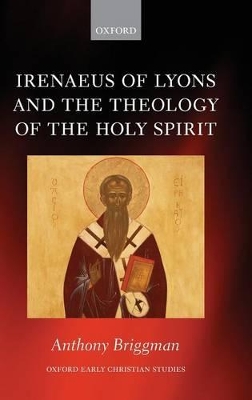Oxford Early Christian Studies
2 total works
For too long certain scholars have been content to portray Irenaeus of Lyons as a well-meaning churchman but incompetent theologian. By offering a careful reading of Irenaeus' polemical and constructive arguments, God and Christ in Irenaeus contradicts these claims by showing that he was highly educated, trained in the rhetorical arts, aware of general philosophical positions, and able to use both rhetorical and philosophical theories and methods in his
argumentation. Moreover, the theological account laid down by his pen was original and sophisticated, supremely so for one of the second century.
In contrast to readings that minimize the metaphysical dimension of Irenaeus' theology, Anthony Briggman establishes as pillars of Irenaeus' polemical argumentation and constructive theology his conception of the divine being as infinite and simple, the reciprocal immanence of the Word-Son and God the Father, divine generation, the union of the divine Word-Son and human nature in the person of Christ, and the revelatory activity of the infinite and incomprehensible Word-Son, amongst other
features of his theology. Briggman offers a fundamentally new understanding of Irenaeus and his thought.
argumentation. Moreover, the theological account laid down by his pen was original and sophisticated, supremely so for one of the second century.
In contrast to readings that minimize the metaphysical dimension of Irenaeus' theology, Anthony Briggman establishes as pillars of Irenaeus' polemical argumentation and constructive theology his conception of the divine being as infinite and simple, the reciprocal immanence of the Word-Son and God the Father, divine generation, the union of the divine Word-Son and human nature in the person of Christ, and the revelatory activity of the infinite and incomprehensible Word-Son, amongst other
features of his theology. Briggman offers a fundamentally new understanding of Irenaeus and his thought.
Irenaeus' theology of the Holy Spirit is often highly regarded amongst theologians today, but that regard is not universal, nor has an adequate volume of literature supported it. This study provides a detailed examination of certain principal, often distinctive, aspects of Irenaeus' pneumatology. In contrast to those who have suggested Irenaeus held a weak conception of the person and work of the Holy Spirit, Anthony Briggman demonstrates that Irenaeus combined
Second Temple Jewish traditions of the spirit with New Testament theology to produce the most complex Jewish-Christian pneumatology of the early church. In so doing, Irenaeus moved beyond his contemporaries by being the first author, following the New Testament writings, to construct a theological account
in which binitarian logic did not diminish either the identity or activity of the Holy Spirit. That is to say, he was the first to support his Trinitarian convictions by means of Trinitarian logic.
Briggman advances the narrative that locates early Christian pneumatologies in the context of Jewish traditions regarding the spirit. In particular, he argues that the appropriation and repudiation of Second Temple Jewish forms of thought explain three moments in the development of Christian theology. First, the existence of a rudimentary pneumatology correlating to the earliest stage of Trinitarian theology in which a Trinitarian confession is accompanied by binitarian orientation/logic, such
as in the thought of Justin Martyr. Second, the development of a sophisticated pneumatology correlating to a mature second century Trinitarian theology in which a Trinitarian confession is accompanied by Trinitarian logic. This second moment is visible in Irenaeus' thought, which eschewed Jewish
traditions that often hindered theological accounts of his near contemporaries, such as Justin, while adopting and adapting Jewish traditions that enabled him to strengthen and clarify his own understanding of the Holy Spirit. Third, the return to a rudimentary account of the Spirit at the turn of the third century when theologians such as Tertullian, Origen, and Novatian repudiated Jewish traditions integral to Irenaeus' account of the Holy Spirit.
Second Temple Jewish traditions of the spirit with New Testament theology to produce the most complex Jewish-Christian pneumatology of the early church. In so doing, Irenaeus moved beyond his contemporaries by being the first author, following the New Testament writings, to construct a theological account
in which binitarian logic did not diminish either the identity or activity of the Holy Spirit. That is to say, he was the first to support his Trinitarian convictions by means of Trinitarian logic.
Briggman advances the narrative that locates early Christian pneumatologies in the context of Jewish traditions regarding the spirit. In particular, he argues that the appropriation and repudiation of Second Temple Jewish forms of thought explain three moments in the development of Christian theology. First, the existence of a rudimentary pneumatology correlating to the earliest stage of Trinitarian theology in which a Trinitarian confession is accompanied by binitarian orientation/logic, such
as in the thought of Justin Martyr. Second, the development of a sophisticated pneumatology correlating to a mature second century Trinitarian theology in which a Trinitarian confession is accompanied by Trinitarian logic. This second moment is visible in Irenaeus' thought, which eschewed Jewish
traditions that often hindered theological accounts of his near contemporaries, such as Justin, while adopting and adapting Jewish traditions that enabled him to strengthen and clarify his own understanding of the Holy Spirit. Third, the return to a rudimentary account of the Spirit at the turn of the third century when theologians such as Tertullian, Origen, and Novatian repudiated Jewish traditions integral to Irenaeus' account of the Holy Spirit.

